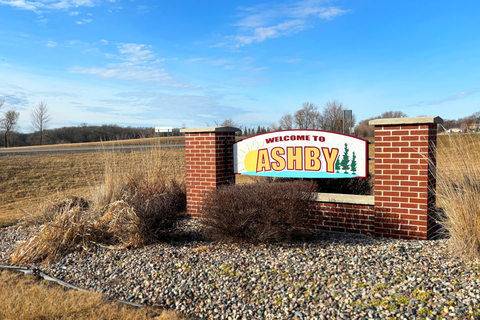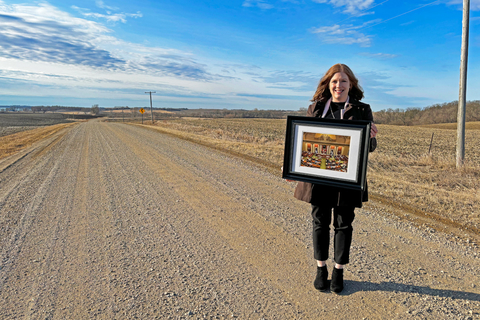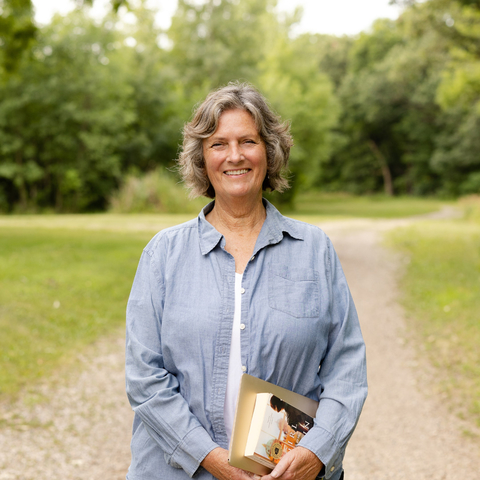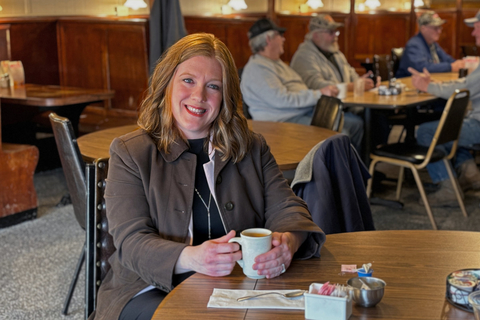Studies show a connection between successful communities and strong leadership. The University of Minnesota Extension has resources and educational opportunities to help community leaders grow and strengthen their leadership.
Located off Highway 94, exactly 100 miles northwest of St. Cloud, lies the small town of Ashby, Minn. (pop. 470). For Mayor Amy Johnson, Ashby isn't just a place to work and raise a family — it's a testament to the quality of rural life she cherishes.
Despite starting out in the Twin Cities, Johnson found herself drawn to the sense of community offered in rural Minnesota.
“Having been raised, lived and worked in the Cities, I chose rural Minnesota for the quality of life,” she says with pride.
As mayor, Johnson’s life in Ashby is far from where she grew up, in more than one way.
“I was raised not to understand or ask questions about the government,” recalls Johnson. “I was taught to vote a certain way, so I didn't cancel my father's vote. So I never tried to understand politics or government.”
Prior to becoming mayor in 2023, Johnson held a substantial career in human resources. Despite her experience, the idea of entering politics initially seemed out of reach.
“Over the years I was asked by some community members if I would consider running for mayor, and the answer was always ‘No,’ because I did not have a political background,” she recalls.
But eventually, Johnson’s concerns were eclipsed after an overwhelming moment while chaperoning her son's fifth-grade field trip to the state capital.
“We sat on the balcony overlooking the House chamber, which was in session, and it was absolutely amazing to me. I experienced a moment that I could not explain. I took a picture because I thought, I'll figure this out later. I blew that picture up and hung it in my office so that I could continue to try to figure out why I left my heart in that room.”
While Johnson contemplated, a friend told her about an organization that could help.
“She said, ‘Have you ever heard of 100 Rural Women?’ And I said, ‘No, but it sounds like something I should explore.”
One hundred and one
“I grew up in rural. I've always had a passion for rural,” shares Teresa Kittridge, the visionary behind 100 Rural Women.
Originally from southwest Minnesota, Kittridge says her spirit never left provincial Minnesota, even when her career took her throughout the nation and around the globe. After 20 years serving as staff in the Minnesota House of Representatives, she held private and nonprofit sector leadership roles, before serving as an executive at a national policy institute. That’s where she found herself in 2016 when she sensed her roots tugging her back home.
“During the presidential election, I was bothered by the treatment of women and the narrow portrayal of rural communities. I just kept thinking, that wasn't the rural America I know and that we need more women leading," recalls Kittridge.
Passionate about the power of women to make transformative change, and concerned about the lack of rural women in positions to make that change, Kittridge resolved to return to Minnesota and take action.
“For our rural places to survive, we need young families to stay, locate, and thrive in our communities. It’s more important than ever that we check our politics at the door and work together for community building,” says Kittridge. “I believe that women can model the way for better collaboration and effective leadership.”
Despite comprising over 50% of the population, data reveals that rural women are disproportionately absent from leadership roles across sectors.
“A statistic that represents this issue is the discrepancy of women serving on county boards. Only about 15% are women, and the majority of those women serve in the metro,” says Kittridge. “So I wanted to understand, as rural women, how do we better support one another and help each other pursue more decision-making leadership roles?”
Kittridge knew she needed to get answers straight from the source. In the spring of 2021, 100 Rural Women partnered with the University of Minnesota Extension Regional Sustainable Development Partnerships to pilot virtual gatherings in rural northeast Minnesota. The work was supported by RSDP through the Mary Page Community University Partnership fund which connected the organization with graduate students to support the pilot program.
“RSDP was key to getting us started. They actually funded the research project, helped us build it, understand the findings, and execute the follow-up.”
100 Rural Women started by convening four small groups of women to dissect how rural women work, participate in communities, learn from one another, and what leadership looks like for rural women. The initiative quickly gained momentum, expanding to communities across the state by convening 100 meetings under the project title, “100 in 100.” Kittridge and her team delved into the orbits of rural women, learning about their journeys, needs and aspirations.
Findings from the 100 in 100 Project
Community
The lack of authentic spaces to connect with rural women in similar leadership roles or life circumstances.
Opportunities
The availability of pathways and positions into leadership roles, no matter the size via in-person and virtual offerings.
Peer support
The need for public and private leadership affirmations of rural women from those closest to them.
“Our goal was to ignite action in community, leadership, civic engagement, and rural entrepreneurship, while simultaneously identifying opportunities and connecting women with each other,” says Kittridge. “Two topics that were especially discussed were women leadership and the importance of mentorship. That’s where the civic mentorship program was born.”
Under the same sky
When Amy Johnson eventually decided to run for mayor of Ashby, she was up against a twenty-year incumbent and won in a landslide with 63% of the vote. When reflecting on her trajectory, she says 100 Rural Women played a pivotal role.
“I actually would not have made the journey to decide to run if it wasn't for 100 Rural Women,” shares Johnson. “It was my gateway to networking with strong professional women like me throughout rural Minnesota.”
100 Rural Women's Civic Mentorship Program provided Johnson with invaluable guidance and support. Paired with Senator Julia Coleman, Johnson found a mentor who not only shared her passion for politics but also offered profound insights into her own capabilities.
“I've had mentors before, but I’ve never made the connection that I made with Senator Coleman,” Johnson reflects. "She explained to me some things about myself that I've never heard anybody tell me before. It really provided clarity in some spaces where I needed it."
Johnson’s experience is one of many. Kittridge says that the civic mentorship program has been incredibly well-received by many rural women. Not only does the organization intend to continue building it out, but they plan to expand into sectors beyond civic engagement.
“Teresa is creating a space for women who want to empower other women and provide resources and connections throughout rural Minnesota,” says Johnson. “It's incredibly unselfish.”
By matching her with a mentor, Johnson says the organization provided her with essential representation, a north star to illuminate the path ahead. Now, she hopes to be a guiding light for others.
“There's a lot of girls that live in my community. Once I became mayor, they started looking at me differently. If I’m out at a ball game or about town, I’ve noticed when they see me, they put their shoulders back and smile,” she says. “This journey was hard but I could never quit. I wouldn't want those girls to see that as an option. We have to keep pushing.”





